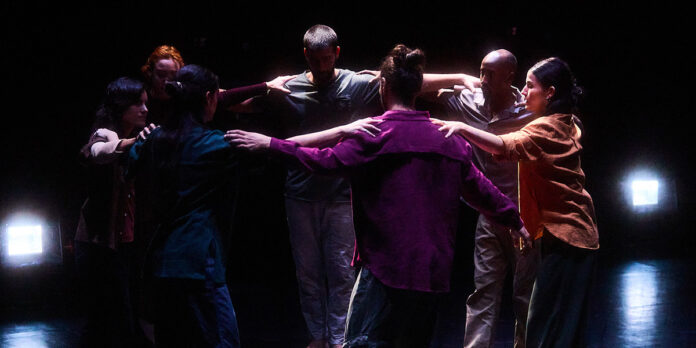CATHERINE Young Dance will present the Palestine-inspired Floating on a Dead Sea at glór on Thursday, October 31.
It features two interconnected works, a documentary recorded from the perspective of a choreographer, which will be shown first, followed by a powerful live performance.
Both pieces weave movement, film, live music, and text to illuminate Palestinian daily life.
Floating on a Dead Sea is a chance to look and listen more deeply, especially to those whose voices are often unheard.
Catherine says that her perspective on Palestine was changed utterly after she made her first ever trip.
“In 2016 I was working on something called the Welcoming Project with asylum seekers and refugees in Kerry,” she said.
“One of the dancers in the group was from Gaza and he taught us the Palestinian dabkeh dance, their traditional dance. We put it in the show, we had African dance, Irish dance, whoever was there we tried to accommodate.
“When we remounted the show for Culture Night one of the dancers brought another Palestinian dancer who had just arrived in Ireland to do a Masters.
“Unbeknownst to me, she sent the trailer of the show out to the Ramallah Contemporary Dance festival in Palestine and they invited us to come over to perform the show in Ramallah and in Jerusalem.
“I took 13 dancers and musicians out there in 2017 to perform there. We did a collaboration with a company out there. That was my first trip there and when you go there it changes everything, you really see what is going on.”
She said that she had been made very welcome, found the people very hospitable, but got an insight “into how unjust and how unfairly they are treated there.”
Catherine also left determined to help in some way.
“When we were leaving we asked how we could help, what could we do and one of the Palestinian dancers said ‘tell people’,” she said.
“I decided I would try to make a show about it, so I could share the stories, what we had experienced and what is happening in the everyday life of people there.”
She returned in 2019 with filmmaker Luca Truffarelli and they recorded a documentary about how people there live.
“We met different people from dancers to farmers to artists, all walks of life. We had a couple of questions we gave everyone,” she said. “One of them was how do you find freedom, and the answers all came back to the ability or inability to move, which is what interests me as a dancer.
“There’s plenty of documentaries made on Palestine and this particular one is through the lens of a dancer and of a choreographer. Movement, dance and art is at the heart of it.”
Well before the horrific events of the last year the Palestinians were living under oppression, she found.
“They can’t move, there are checkpoints everywhere. It’s very difficult for people to plan or travel,” she said.
“They can’t necessarily go to visit relatives because of checkpoints. There’s an apartheid wall, it goes through villages, through people’s land, some people are on one side and other parts of their family on the other.
“When we were travelling to Jerusalem with our show some of our cast weren’t granted permits to come with us, so I had to change the show on the day because we didn’t have the full cast. Everyone you talk to has a story and shares their experiences and a lot of that ended up in the film. ”
People here have more in common with the Palestinians than they might realise, she feels.
“One of the things I wanted to do with the documentary is to share how like us they are,” she said.
“They want to get on with their lives, they have their hopes and dreams, they want to have families, go to college, they want the same things as us.
“They are very similar to the Irish in terms of their sense of humour, they’re a very joyous people as well. In the dance in particular I wanted to share their dance, their culture and their joy as well.” The live performance isn’t about politics or the intolerable cruelty of Israel, but about genuine Palestinian culture.
“When I made the first one I wanted to tell people about what was happening, but we know about that now, and the responsibility was to share something different, what we’re not seeing in the news, the softer side of Palestinian culture,” she said.
Four of the seven dancers in the show are from the West Bank and she says they feel a responsibility to their own culture, which is under siege.
“The dancers that we are working with feel really strongly about not being portrayed as victims,” she said. “They are very strong people and they want to share their culture. They want to show they are like the rest of us and they have really valuable contributions to make to the world.
“They are very resilient and all of us have learned so much from them.”
After the show concludes in a few weeks it will be hard to see them go back to the West Bank.
“When they go back it will be very hard after the last show, after having a very deep connection over seven weeks,” she said.
“We get to stay here with our freedoms and they go into a very difficult situation.”
There will be an after show session in the glór foyer, led by Violvetine, Quentin Cooper and Severin Pigot with Brian Fleming. There will also be local musicians, members of the cast and the North Clare Refugee Allstars.
Owen Ryan has been a journalist with the Clare Champion since 2007, having previously worked with a number of other publications in Limerick, Cork and Galway. His first book will be published in December 2024.



